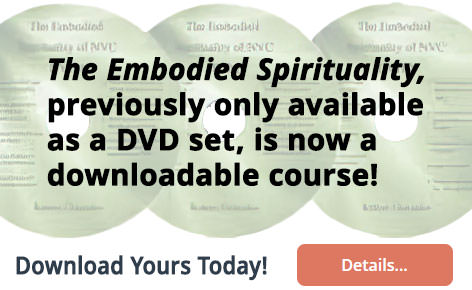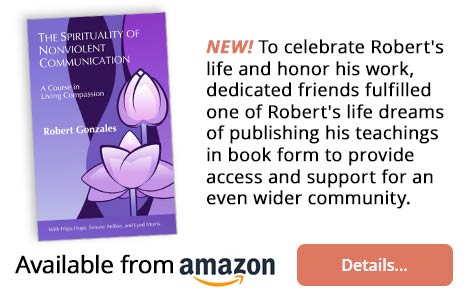

Welcome to the Robert Gonzales Training Legacy. Here you can learn more about Robert and the powerful teachings he dedicated his life to. NVC Academy is proud to house and share with you the complete body of his life's work. We invite you to explore, learn, and help keep his legacy alive!
Robert's passion was in the spirituality of the Nonviolent Communication (NVC) process. He saw NVC both as a process that helps people connect more authentically with themselves and others, and as a spiritual practice and way of living. The worldwide NVC community mourned when Robert died in 2021. He left behind a legacy of work that emerged from a lifetime of inquiry into the intersection between spirituality and human communication. More about Robert.
Trainer Tip
1 - 2 minutes
Trainer Tip: Requests include a specific action to help us get our needs met. If we have a complaint or in conflict, and we don’t make specific requests, people are left guessing and/or wondering about what will meet our needs. Our chances for getting our needs met can then become limited. Instead, try ending with a request to let the other person know exactly what you would like to happen.
Details...Video
4 minutes
Sometimes life gets so busy that even the things you enjoy seem to go by without you receiving that feeling of joy. It's important that even when we are busy to celebrate life to the full. In this month's Life Hack Gesine explores 7 things to keep in mind when remembering to celebrating life.
Details...Practice Exercise
2-3 minutes
When you attempt to make a request what limiting beliefs come up? See if you recognize any from this list. Then compassionately observe your body sensations, impulses, feelings, needs, memories, energy, and images. In making the request ensure your request is connected to your needs, is doable, what you want, and not attached to them saying yes.
Details...Video
15 minutes
Listen in as Dian shares her tips and sense of urgency around bringing NVC skills to work: 1) How to use your imagination (visualization!) to help you connect with somatic responses and needs; and 2) Five built-in advantages to sharing NVC in the work place.
Details...Trainer Tip
1 - 2 minutes
Trainer Tip: At least once today celebrate yourself and your progress, every step of it. We all have a starting point. No matter where you are in your life, you have made progress. Every mistake, every victory, and every confusing moment can lead you forth and can be something to celebrate.
Details...Practice Exercise
4 -6 minutes
When someone stimulates your pain, you may want them to express care and empathy for your experience. If they're unwilling, you may resent it. You may forget the power of many strategies to meet a need, and you lose your agency. This can lead to reactive habits in you -- such as pleading, demanding, or attacking. Here are reasons you may not be getting an apology or empathy, and what options you have in moving forward.
Details...Trainer Tip
1 - 2 minutes
Trainer Tip: Today, when you tell yourself that you "have to" or "should" do something, notice what you feel and experience - is it a sense of duty, obligation, guilt, shame, overwhelm, constriction, heaviness? Then consider the underlying needs you are trying to meet with the activity. This can shift the purpose and intention with an energy that motivates our actions can bring empowerment and joy to our lives.
Details...Article
11 - 26 minutes
In the "obnoxious stage" we care for our needs in a way that doesn't respect others' needs. In the "emotional liberation" stage we fully care for others' needs as much as our own—while being free of fear, guilt, shame, or obligation. Often NVC training teaches us how to achieve the latter stage without the former. For greater compassion we can be more rigorous in how we talk about “responsibility", impacts and interdependence.
Details...Practice Exercise
2 - 3 minutes
Anger matters because it can let you know that you perceive a threat to universal need for yourself or someone else. It can draw your attention to something so that you can take effective action. Anger becomes a hindrance when you amp it up with your thoughts about what should(n't) happen. Instead, notice any "should" thoughts, see anger as a signal, accept that it's okay to have it, and look for feelings and needs underneath it.
Details...Trainer Tip
1 - 2 minutes
Trainer Tip: People tend to look, act, and sound softer when they have been more fully heard. If you're unsure whether someone has been heard and you want to be cautious, you may ask them, “Is there anything else you’d like me to hear?”. If you try to reason with or educate them before they're heard, they'll likely respond negatively. After they're heard, you may notice a willingness on their part to listen and proceed.
Details...

